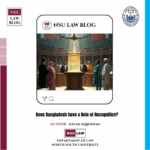Tax Evasion: Mechanisms and the Impact of Double Taxation on Corporate Compliance
Tax evasion is a prevalent issue in many developing economies. It refers to the intentional and illegal avoidance of paying tax. It is an act where individuals or corporations willingly misrepresent or conceal their financial status to reduce their tax obligations. These practices violate tax laws and result in significant losses in government revenue.
Despite the absence of a statutory definition of tax evasion in Bangladeshi law, the concept is widely understood and recognized as a criminal offense. Any failure to disclose all taxable income or deliberate attempts to mislead the tax authorities constitute tax evasion. In Bangladesh, citizens often evade taxes through underreporting, non-payment, or providing fraudulent information. Income from assets held abroad but not reported to the local tax authority is also a prevalent form of evasion. Such widespread evasion is invoked by limited enforcement, weak regulatory mechanisms, and a lack of transparency within public institutions, including the National Board of Revenue (NBR).
In developing countries, corporations are usually the dominant taxpayers. An issue that harms corporate tax compliance in Bangladesh is the double taxation of corporate income. This refers to the taxation of profits at the corporate level, followed by additional taxation when those profits are distributed as dividends to shareholders. The double tax burden discourages firms from distributing dividends and deters individuals from investing in capital markets. It is weakening overall economic growth. In this context, many companies prefer to retain their earnings rather than share them with investors. It reduces the investor’s confidence and limits the capital market development.
Corporate income in Bangladesh is taxed at a higher rate compared to many other countries in the Asia-Pacific region. Countries like Hong Kong and Singapore maintain corporate tax rates below 30 per cent, and Japan maintains its at 41 per cent. China has reduced its corporate income tax rate from 33 per cent to 25 per cent. Whereas India proposed a 25 per cent tax rate on corporate income. Pakistan, Albania, Brazil, Germany, etc., are also known for lower rates of corporate taxes. These rates are lower than the federal corporate income tax rates of the United States, which are at 35 per cent. Compared to them, Bangladesh imposes a rate as high as 45 per cent, and it has been more or less the same for the last 5 years. This high rate, combined with the issue of double taxation, serves as a deterrent for corporate compliance. It creates a hostile environment for domestic and foreign investors and harms the country’s global market competitiveness.
A reason that the government doesn’t reduce corporate tax is that they are too reliant on it. They cannot reduce it without affecting the lower-income group. Since most of them pay a smaller amount of tax compared to corporations. Lowering the tax rates in India has shown a significantly improved tax compliance index.
Tax evasion is a predominant phenomenon in environments where tax systems are complex, rigid, and poorly enforced. Bangladesh’s income tax system suffers from various inefficiencies, including excessive concessions, unequal treatment of different sectors, and outdated laws. The tax administration cannot often effectively monitor and collect taxes. This leaves room for arbitrary decision-making and corruption. Moreover, the regulatory enforcement mechanisms are weak, especially against powerful corporate actors, allowing them to exploit legal loopholes or bribe officials to evade taxes.
Addressing these challenges requires a multifaceted approach. Simplifying the tax system, strengthening enforcement, reducing the corporate tax rate, and eliminating the double taxation of dividends are essential steps. Additionally, creating incentives for compliance, such as recognizing top taxpayers with civic honors and imposing heavier penalties for evasion, can develop a culture of tax responsibility. Raising awareness about the social costs of tax evasion and enhancing transparency within tax institutions are also critical to restoring public trust and improving compliance.
In conclusion, tax evasion weakens the social contract between citizens and the state by eroding the government’s capacity to serve its people. In developing countries like Bangladesh, it impedes economic development, increases inequality, and hampers achieving sustainable development goals (SDGs). Corporate tax compliance is further hampered by policies like double taxation, which discourage investment and revenue declaration. Therefore, tax reform must prioritize fairness, simplicity, and efficiency to ensure that every sector of the economy contributes equitably to national development.
Bashirul Islam Bihango1 Posts
A 3rd-year student of North South University at the Department of Law. He has a strong interest in the field of legal research.

0 Comments